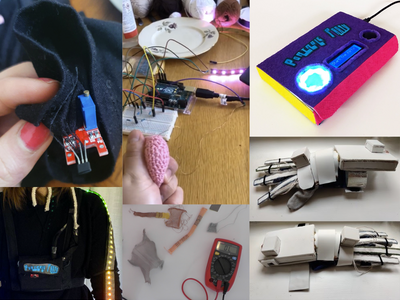The course gives an introduction to sensors and actuators and how they can be programmed and used in a commercial embedded system (such as Arduino or Raspberry Pi). The course has a theoretical part in which different properties of sensors and actuators and their respective input and output signals are examined, as well as a practical part directed towards realisation of an interactive multi-modal installation.
DM1588 Sensor Programming for Media Technology 6.0 credits

This course will focus on the programming of embedded platforms and how they can be used with sensors and actuators in the design of interactive applications.
Image: Projects from VT2021 students: Linnéa Gustafsson, Emma Hagrot, Caroline Lindahl, Nathalie Lock, Johan Christian Ragnar Ottosson, Susanna Sarne, Gustav Sundin, Oskar Svanström
Information per course offering
Choose semester and course offering to see current information and more about the course, such as course syllabus, study period, and application information.
Information for Spring 2026 Start 13 Jan 2026 programme students
- Course location
KTH Campus
- Duration
- 13 Jan 2026 - 13 Mar 2026
- Periods
Spring 2026: P3 (6 hp)
- Pace of study
50%
- Application code
60851
- Form of study
Normal Daytime
- Language of instruction
English
- Course memo
- Number of places
Places are not limited
- Target group
- Open for CMETE. Not open to other programmes. Not open to exchange students.
- Planned modular schedule
- [object Object]
- Schedule
- Part of programme
Contact
Course syllabus as PDF
Please note: all information from the Course syllabus is available on this page in an accessible format.
Course syllabus DM1588 (Spring 2022–)Content and learning outcomes
Course contents
Intended learning outcomes
After passing the course, the student should be able to
- explain basic principles of sensors and actuators
- explain the function of different sensors and actuators (e.g. ultrasonic sensors, temperature and humidity sensors, light sensors, accelerometers, magnetometers, pressure sensors, simple electrical and mechanical actuators),
- recommend appropriate sensors for implementing a specific input modality
- recommend appropriate actuators for implementing a specific output modality
- program an embedded platform
- design and program interactive applications that use sensors and actuators
in order to
- be able to use embedded platforms, sensors and actuators to design interactive applications.
Literature and preparations
Specific prerequisites
Knowledge and skills in programming, 6 credits, equivalent to completed course DD1337/DD1310-DD1318/DD1321/DD1331/DD100N/ID1018.
Knowledge in basic computer science, 6 credits, equivalent to completed course DD2325/DD1320/DD1325/DD1327/DD2325/ID1020/ID1021.
Active participation in a course offering where the final examination is not yet reported in LADOK is considered equivalent to completion of the course.Registering for a course is counted as active participation.The term 'final examination' encompasses both the regular examination and the first re-examination.
Literature
Examination and completion
Grading scale
Examination
- LAB1 - Laboratory work, 3.0 credits, grading scale: P, F
- PRO1 - Project, 3.0 credits, grading scale: A, B, C, D, E, FX, F
Based on recommendation from KTH’s coordinator for disabilities, the examiner will decide how to adapt an examination for students with documented disability.
The examiner may apply another examination format when re-examining individual students.
If the course is discontinued, students may request to be examined during the following two academic years.
Other requirements for final grade
To pass LAB1 or PRO1, active attendance at seminars is required (you are allowed to miss two seminars).
Examiner
Ethical approach
- All members of a group are responsible for the group's work.
- In any assessment, every student shall honestly disclose any help received and sources used.
- In an oral assessment, every student shall be able to present and answer questions about the entire assignment and solution.
Further information
Course room in Canvas
Offered by
Main field of study
Education cycle
Supplementary information
In this course, the EECS code of honor applies, see:
http://www.kth.se/en/eecs/utbildning/hederskodex